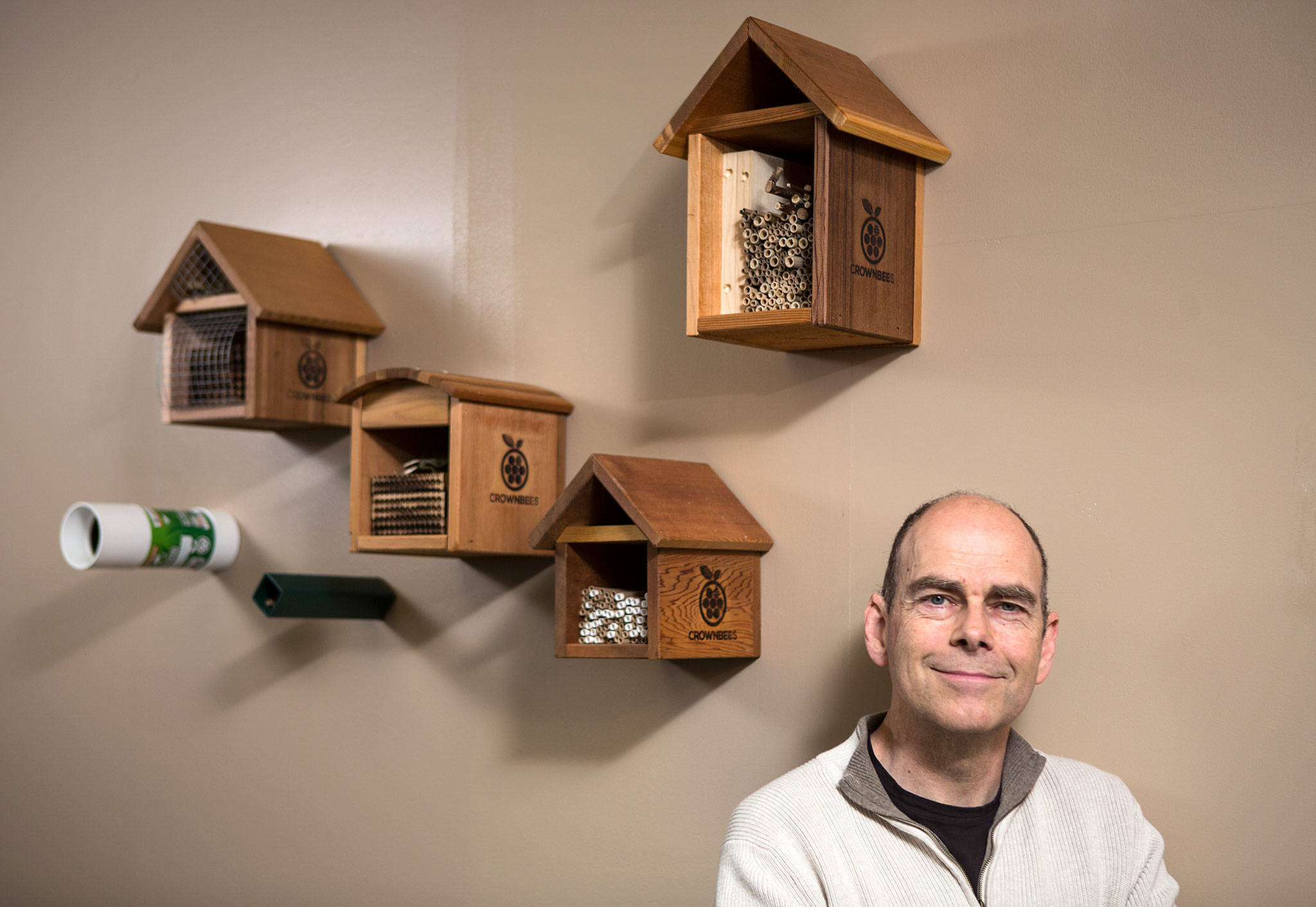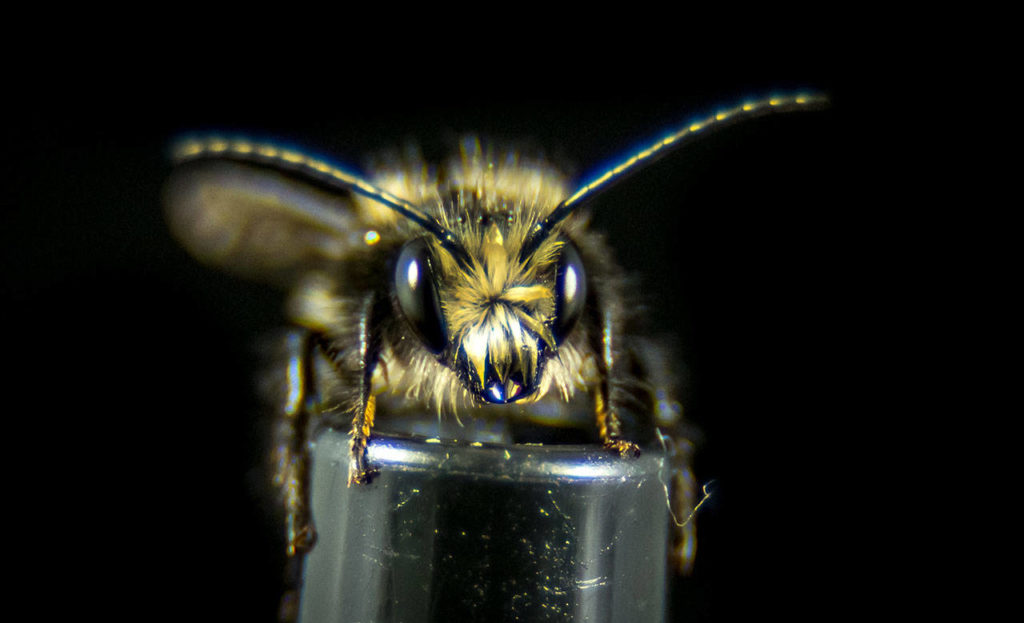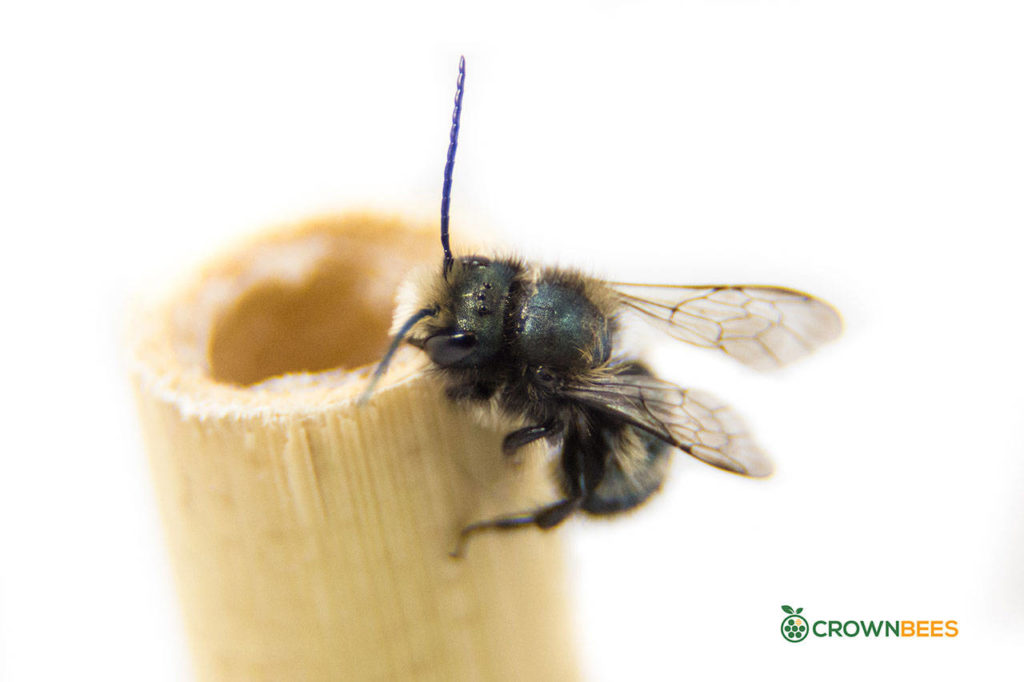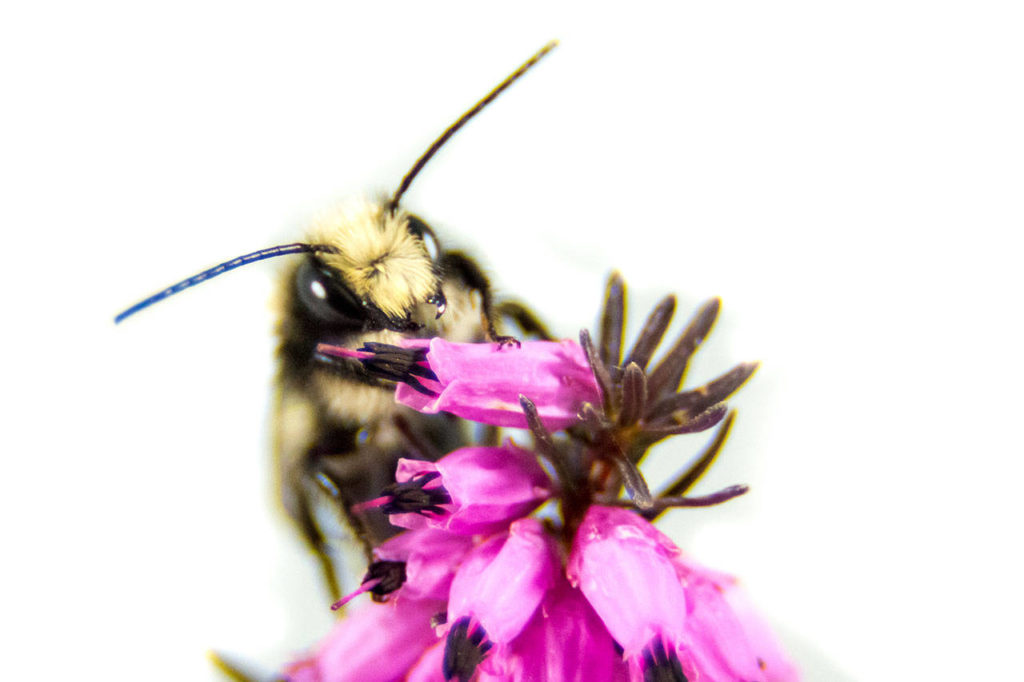WOODINVILLE — Buds are blooming, bees are buzzing and one company sees a way to make money while possibly saving the world’s crops.
Crown Bees has been around for almost a decade selling mason and leafcutter bees and their habitats. The Woodinville-based company sells up to 400,000 bees each year, and that makes it a natural fit to spur citizen-science research into the estimated 4,000 hole-nesting bee species native to North America.
Washington has native mason bees, which do not produce honey, nest in holes and are different from the hive-dwelling honey bee.
The Native Bee Network was launched by Crown Bees to provide education and equipment to identify and study native hole-nesting bees across the country. The company sells at-cost wild bee habitats made from PVC pipe with reeds and twigs for nesting. Customers include schools, universities, utilities and select scientists.
Theoretically, native hole-nesting bees will set up and procreate in the habitats, allowing the network partners to collect cocoon samples. Eventually, they can send samples to Crown Bees for analysis and database creation. With a serial number sticker on a habitat, a Native Bee Network partner can enter it into a web app for all of the participants to track. Already the company receives bees from people across the country.
The data would point to where bees are concentrated and which species are present.
“They were once here,” said Crown Bees founder and owner Dave Hunter. “Can we find them?”
Honeybees dominate the pollination industry, valued at $29 billion in 2010 in a Cornell University study. The “beenado” incident in April 2015 cast a local spotlight on the practice. A truck carrying 448 honeybee hives from Eastern Washington to a blueberry farm in Lynden overturned on I-5 near Lynnwood. Bee hives are hauled all over the state to ensure large crops are properly pollinated to produce a robust yield.
With widespread sudden die-offs — called colony collapse disorder — occurring in the past 20 years, Hunter saw an opportunity for Crown Bees to help solve a global problem while opening up new revenue as a leader in pollinator diversification.
“Polyculture is probably better than monoculture,” Hunter said. “… We are leading the change to create bee diversity.”
That’s not to say he maligns the earnest honeybee or its sweet production. Nor has he imagined all the steps between identifying the various species of native bees and their possible applications as commercial pollinators.
Mason bees, for example, are homebodies that prefer to stay near their nests. That limits their usefulness for large-scale agriculture.
“Their short flight range makes them very useful for home orchardists, and equipment needs are small compared to honey bees,” said Dave Pehling, Washington State University Extension Snohomish County master beekeeper. “Most research indicates about 250 mason bees can pollinate nearby tree fruits better than a big hive of honeybees.”
Crown Bees obtains hole-nesting bees from partners around Washington, including through its bee buyback program. Hunter said about a quarter of the bees they sell each year are from customers who wind up with more bees than they wanted.
“I care about the bees,” said Demarus Tevuk Sandlin, Crown Bees’ environmental programs manager. “I don’t want to send you bees and have them die.”
Keeping mason bees and other native bees available is cheaper for the hobby gardener looking to juice their tomato yield or cherry picking. The cheapest starter kit costs $25.95. Something resembling a birdhouse runs closer to $100 and up to $165, which includes mason and leafcutter bee cocoons, nesting materials and a container for safe cocoon storage/hibernation. The wood houses are sourced from First Nations lumber in British Columbia, then assembled by a shop in Mukilteo. The nesting trays are made in Tacoma and Port Townsend.
Larry Brainard, a Washington State Beekeepers Association director who lives in Edmonds, said the cost to get started with honeybees is high. He would know. His beekeeping hobby “ran amok” to upward of 150 colonies before he worked down to around 80 colonies, which he acknowledged “is also insane.” Starting a colony of honeybees requires a beekeeper suit between $30 and $130, proper gloves around $15, hive tools totaling about $40, purchasing bees for upward of $200, and two colony structures for between $500 and $600.
“Mason bees require very little management,” Brainard said. “Honeybees require a lot of care, a lot of experience, a lot of vegetation to maintain them and manage them properly.”
One of the strengths of the honeybee is its transportability, “beenado” crash aside.
“The unique feature of the honeybee is that a beehive managed by a commercial beekeeper can be transported from one geographic location to another location to pollinate whatever the crop is,” Brainard said.
Pehling said dormant mason bees, which only get active when the temperature hits 55 degrees by spring in late March or April in Western Washington, are easier to transport than “big colonies of very active honey bees.” For one, mason bees are not aggressive stingers. During a visit to the company, both Hunter and Tevuk Sandlin handled a live mason bee without incident.
Using something as simple as a PVC pipe with reeds, raspberry twigs or pine planks with holes drilled in them can make a perfectly suitable habitat for any wild or native bees that might buzz around in Puget Sound-area back yards.
The idea is to set them up in a suitable place, somewhere near water, leaves, flowers, and maybe some mud, and see what nests there. More specifically, the goal is to find what “useful” species nest there and at other Native Bee Network sites.
So far, Hunter said, the company has seen international research showing improved yields at crops pollinated by some mason bee species. Taking it from home garden improvement to commercially prudent endeavor is at least a few years off.
“Is it a viable commodity? No. Not yet,” he said.
Similar to a honeybee, Hunter is hoping the work he and the Native Bee Network do now will produce something bountiful later.
Ben Watanabe: bwatanabe@heraldnet.com; 425-339-3037. Twitter @benwatanabe.
Talk to us
> Give us your news tips.
> Send us a letter to the editor.
> More Herald contact information.




























